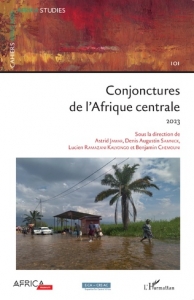
Conjonctures de l’Afrique centrale 2023 is a collective work of 29 authors, 21 of whom are African researchers and "working in the South", to whom the voice is given because they are too often under-represented in scientific debates.
They present their in-depth analyses through four axes: "agenciétés" from feminist perspectives, the construction of identity among Afrodiasporic groups of different generations and integration into regional institutions, resistance and governance strategies deployed to thwart precariousness and insecurity, and recent developments in the mining sector.
This volume covers the post-COVID-19 pandemic period, which is marked by the reopening of borders, the entry of the Democratic Republic of Congo (DRC) into the East African Community, increased pressure related to the extraction of natural resources in the region, but also the expiry of certain electoral mandates.
Published in the "Cahiers Africains" collection of the Royal Museum for Central Africa by L'Harmattan (Paris), this volume is available on the L'Harmattan website
The chapters will be available here in open access in 2024.
Introduction Astrid Jamar, Denis Augustin Samnick, Lucien Ramazani Kalyongo & Benjamin Chemouni
Partie I : Silence, violence et carcéralité : « agenciétés » féministes de Kinshasha à Makamba
1. Kinshasa : violence urbaine au féminin
Catherine Mambiko Nyabita
2. When the hen sings: The role of silence in women’s participation in peacebuilding in Burundi
Kara Ann Hooser, Marie Chantal Kanyange, and Beatrice Nijebariko
3. Compositions carcérales. Les redevabilités du collectif de la détention des femmes à la prison centrale de Kinshasa
Sara Liwerant et Everett Nionzi Nzolani
Partie II : Au-delà des frontières : questions transfrontalières, bricolages culturels, et intégration régionale
4. Bricolages culturels et sentiment identitaire : le cas des Rwandais de Bruxelles
Jean-Luc Nsengiyumva
5. Entrée de la RDC dans la Communauté d’Afrique de l’Est : les leçons tirées d’un modèle de gravité
Minane Mpore, Mumbere E. Lubula, Asclépiade Mufungizi Mutagoyora & Kamala C. Kaghoma
Partie III : Gouvernance, résistances et stratégies déjouant précarité et insécurité
6. Le cumul d’emplois dans la fonction publique en République démocratique du Congo : droit et pratiques
Guy Mabi
7. État de siège dans les provinces du Nord-Kivu et de l’Ituri. La recherche de la paix en mettant la charrue avant les bœufs
Albert Malukisa Nkuku
8. Gouvernance des ressources naturelles et conflictualité à Lwindi : (re)penser le rôle des autorités coutumières dans le contexte armé dans l’Est de la RDC ?
Esther Borauzima
9. Manne halieutique et comportement des acteurs au lac Kivu : conflits latents, résistance et stratégies des pêcheurs
Espoir Kulimushi Mugabo, Michel Akilimali Zaramba & Emery Mushagalusa Mudinga
10. « Le parc a tué notre identité. » Conservation de la nature et déracinement identitaire des Peuples autochtones batwa du Sud-Kivu
Vedaste Cituli, Emery Mundinga et An Ansoms
Partie IV : Un secteur minier qui se réinvente en RDC ?
11. Assurance de groupe : un remède à l’insécurité sociale des exploitants artisanaux des mines ?
Christian Byaombe Malumalu
12. Nodal governance in the context of institutional conflicts in the artisanal mining sector in Haut-Katanga
Espérant Mwishamali Lukobo
13. Mitigating the risks as justification for a new extractivist frontier? Congolese artisanal cobalt and the development of deep sea mining
Raphael Deberdt